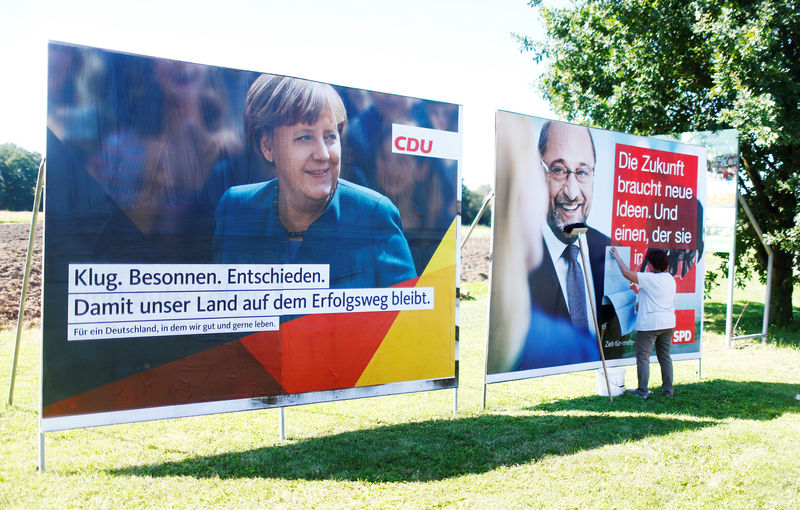By Paul Carrel and Michel Rose
BERLIN/PARIS (Reuters) - The leaders of Germany and France said on Tuesday they are ready to press ahead with deeper European integration, promising a tighter euro zone at the core of the European Union shaken by Britain's vote to leave.
French President Emmanuel Macron, elected in May on a pro-EU platform, said he wanted to strengthen Europe's single currency union in light of Brexit and pledged to announce proposals after Germany's election on Sept. 24.
"This is a revamp that we need," he told an annual assembly of French ambassadors in Paris, promising "concrete steps in around 10 areas" and adding that the EU could not afford to "get stuck in routine or technocratic quarrels".
"Brexit should not take up all our energy," he added as British and European Commission officials hold a third round of talks this week on Britain's departure from the EU.
In Berlin, Chancellor Angela Merkel, who met Macron on Monday, endorsed the idea of a European Monetary Fund and said she could imagine creating a combined European finance and economy minister.
In power since 2005, the conservative chancellor, 63, is comfortably on course to win re-election, which would allow her to pursue deeper euro zone integration together with Macron.
Describing a European Monetary Fund as a "very good idea", Merkel told reporters: "It could make us even more stable and allow us to show the world that we have all the mechanisms in our own portfolio of the euro zone to be able to react well to unexpected situations."
Such a Fund would evolve out of the European Stability Mechanism (ESM) - a rescue facility set up in 2012 to help defuse the euro zone crisis that threatened to tear apart the common-currency bloc at the heart of the EU.
Merkel, who wants to proof the currency union against future crises, said she did not rule out a French idea to have a common euro zone finance minister. "I could also imagine a (combined) economy and finance minister," she said, adding that this could allow for better coordination on budget and economic policies.
Speaking for more than 1-1/2 hours, Merkel addressed a wide range of issues in good humour two days after her main election challenger, Social Democrat Martin Schulz, accused her of being aloof and out of touch with voters.
She also called for more European cooperation on migrant policy, pressed Turkey to release German citizens it has detained, and said she could not hold her tongue on the issue of the rule of law in Poland.
MERKEL REVIVED
Last year, Merkel suffered a drop in popularity after more than a million migrants fleeing war in the Middle East flooded into Germany. But with the influx since stemmed, she has bounced back with renewed conviction.
An opinion poll released on Tuesday showed her conservatives 13 points ahead of Schulz's Social Democrats.
A day after Europe's "big four" continental powers and three African states settled on a plan to tackle their migrant crisis, Merkel pressed her European peers to do still more. "Europe has not yet done its homework," she said.
Turning to Turkey, Merkel ruled out an expansion of the EU's customs union with Ankara.
Ties between Ankara and Berlin have become increasingly strained in the aftermath of last year's failed military coup in Turkey as Turkish authorities sacked or suspended 150,000 people and detained more than 50,000, including other German nationals.
"I would like to have better ties with Turkey but we have to look at reality... This is a very complicated phase in our relations," she said.
Merkel further said she could not remain mum about what EU leaders, activists and opposition politicians in Poland say is a lurch towards authoritarianism in Warsaw under the nationalist Law and Justice Party (PiS), which won election in 2015.
"...The rule of law in Poland - that's a serious issue because the requirements for cooperation within the European Union are the principles of the rule of law," she said.
"We cannot simply hold our tongues and not say anything for the sake of peace and quiet." Merkel added that she would address the issue "in detail" with European Commission President Jean-Claude Juncker when he visits Germany on Wednesday.
PiS says the criticism, which culminated last week with Macron saying the Polish people deserved a better government, is unacceptable foreign meddling.
